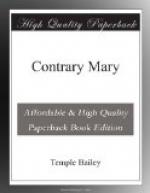As he stood looking down at the little table, he was thrilled by the sense of safety after a storm. Outside was the world with its harsh judgments. Outside was the rain and the beating wind. Within were these signs of a heart-warming hospitality. Here was no bleak cleanliness, no perfunctory arrangement, but a place prepared as for an honored guest.
Down-stairs Mary was explaining to Aunt Isabelle. “I’ll have Susan Jenks take some coffee to him. He’s to get his dinners in town, and Susan will serve his breakfast in his room. But I thought the coffee to-night after the rain—might be comfortable.”
The two women were in the dining-room. The table had been set for three, but Barry had not come.
The dinner had been a simple affair—an unfashionably nourishing soup, a broiled fish, a salad and now the coffee. Thus did Mary and Susan Jenks make income and expenses meet. Susan’s good cooking, supplementing Mary’s gastronomic discrimination, made a feast of the simple fare.
“What’s his business, my dear?”
“Mr. Poole’s? He’s in the Treasury. But I think he’s studying something. He seemed to be so eager for the books——”
“Your father’s books?”
“Yes. I left them all up there. I even left father’s old Bible. Somehow I felt that if any one was tired or lonely that the old Bible would open at the right page.”
“Your father was often lonely?”
“Yes. After mother’s death. And he worked too hard, and things went wrong with his business. I used to slip up to his bedroom sometimes in the last days, and there he’d be with the old Bible on his knee, and mother’s picture in his hand.” Mary’s eyes were wet.
“He loved your mother and missed her.”
“It was more than that. He was afraid of the future for Constance and me. He was afraid of the future for—Barry——”
Susan Jenks, carrying a mahogany tray on which was a slender silver coffee-pot flanked by a dish of cheese and toasted biscuit, asked as she went through the room: “Shall I save any dinner for Mr. Barry?”
“He’ll be here,” Mary said. “Porter Bigelow is taking us to the theater, and Barry’s to make the fourth.”
Barry was often late, but to-night it was half-past seven when he came rushing in.
“I don’t want anything to eat,” he said, stopping at the door of the dining-room where Mary and Aunt Isabelle still waited. “I had tea down-town with General Dick and Leila’s crowd. And we danced. There was a girl from New York, and she was a little queen.”
Mary smiled at him. To Aunt Isabella’s quick eyes it seemed to be a smile of relief. “Oh, then you were with the General and Leila,” she said.
“Yes. Where did you think I was?”
“Nowhere,” flushing.
He started up-stairs and then came back. “I wish you’d give me credit for being able to keep a promise, Mary. You know what I told Con——”




